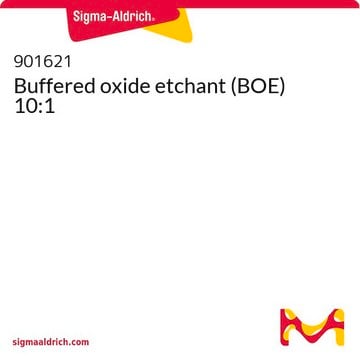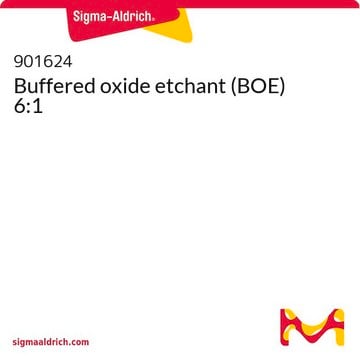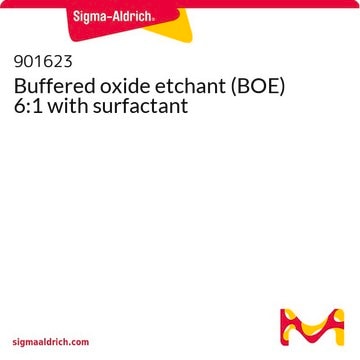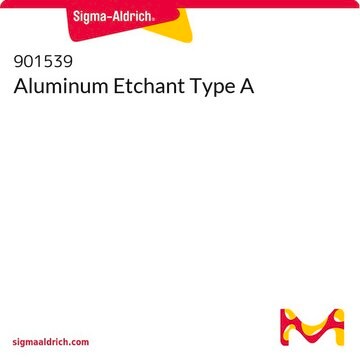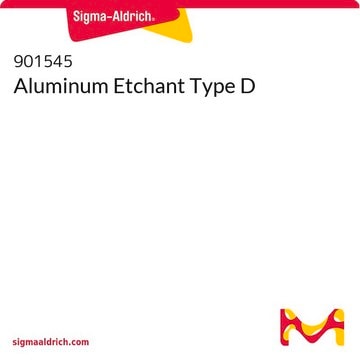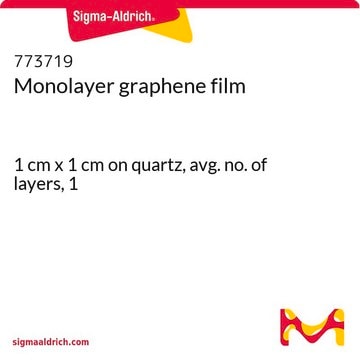Recommended Products
form
liquid
color
colorless
pH
3-5
Looking for similar products? Visit Product Comparison Guide
General description
Advantages:
- Ready-to-use - Economical
- HF activity buffer stabilized
- Excellent process reproducibility
- Does not undercut masked oxide
- Will not stain diffused silicon surfaces
- Avoids contamination on silicon surfaces
- Photoresist coating unaffected
Buffer HF improved is an idealized buffer preparation characterized by a high buffer index and an optimized, uniform oxide-etch rate. The composition of buffer HF improved is precisely controlled by HF activity measurements and electrometric pH. The mass balance corresponds essentially to (HF) + (F) + 2(HF2) for a two-ligand mononuclear complex and the charge balance is (H+) - (F) + (HF2- ). The HF activity is maintained constant through the specific equilibrium constant which regulates the equilibrium reaction between fluoride, bifluoride, and HF buffer components. A second equilibrium constant participates in the regulation of the hydronium in concentration of pH.
Buffer HF improved is produced and analyzed to be essentially free of impurities. Nitrate ions, a common impurity causing stains on diffused silicon surfaces, are specifically removed. Heavy metal impurities, which can lead to degradation of device characteristics, are rigidly controlled under manufacturing process specifications.
Application
- Buffer HF improved dissolves silica films (both thermally grown and silane SiO2) produced on the surfaces of silicon and exposed by photolithography. It also is capable of dissolving doped silica films such as phosphosilica and borosilica glasses as formed in semiconductor processing. The overall chemical reaction is: 4HF + SiO2 SiF4 + 2H2O
- For trouble-free operation Buffer HF improved is recommended in the new technologies for manufacture of semiconductor planar and mesa devices. It is compatible with both negative and positive photoresists. Excellent results with good reproducibility are simple to achieve without undercutting marked oxides, surface staining or device degradation by metallic impurities.
Preparation Note
Most practical oxide passivation layers range from 2000 Å to 5000 Å in thickness, and good results are obtained by exposure in Buffer HF improved for 2 to 5 minutes at room temperature. Exposure time may be decreased or increased if necessary. Buffer HF improved should be rinsed off with deionized water. The high buffer index of Buffer HF improved permits repeated use of the buffer at fixed exposure time. For faster etch rate (approx. 2X) use Buffer HF improved at 35 °C.
Signal Word
Danger
Hazard Statements
Precautionary Statements
Hazard Classifications
Acute Tox. 1 Dermal - Acute Tox. 2 Inhalation - Acute Tox. 2 Oral - Eye Dam. 1 - Skin Corr. 1A
Storage Class Code
6.1B - Non-combustible acute toxic Cat. 1 and 2 / very toxic hazardous materials
WGK
WGK 2
Flash Point(F)
Not applicable
Flash Point(C)
Not applicable
Certificates of Analysis (COA)
Search for Certificates of Analysis (COA) by entering the products Lot/Batch Number. Lot and Batch Numbers can be found on a product’s label following the words ‘Lot’ or ‘Batch’.
Already Own This Product?
Find documentation for the products that you have recently purchased in the Document Library.
Articles
Professor Gogotsi and Dr. Shuck introduce MXenes: a promising family of two-dimensional materials with a unique combination of high conductivity, hydrophilicity, and extensive tunability.
Professor Gogotsi and Dr. Shuck introduce MXenes: a promising family of two-dimensional materials with a unique combination of high conductivity, hydrophilicity, and extensive tunability.
Professor Gogotsi and Dr. Shuck introduce MXenes: a promising family of two-dimensional materials with a unique combination of high conductivity, hydrophilicity, and extensive tunability.
Professor Gogotsi and Dr. Shuck introduce MXenes: a promising family of two-dimensional materials with a unique combination of high conductivity, hydrophilicity, and extensive tunability.
Our team of scientists has experience in all areas of research including Life Science, Material Science, Chemical Synthesis, Chromatography, Analytical and many others.
Contact Technical Service